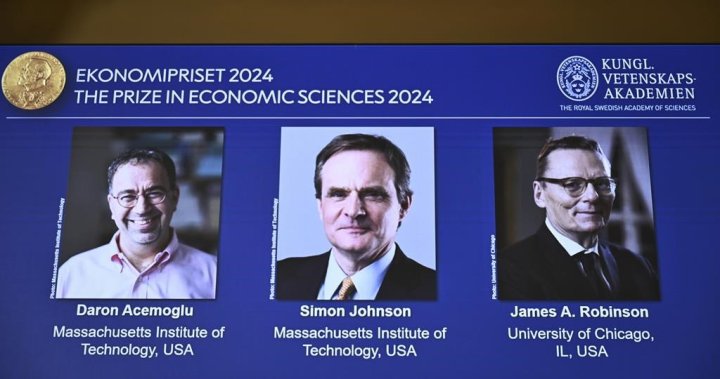Three US-based academics won the 2024 Nobel Prize in Economics on Monday for their research that explored the effects of colonialism to understand why global inequality persists today, especially in countries plagued by corruption and dictatorship.
The Royal Swedish Academy of Sciences said Simon Johnson and James Robinson, both British-Americans, and Daron Acemoglu, a Turkish American, were praised for their work on “how institutions shape and influence prosperity.”
“Reducing the vast disparities in income between countries is one of the greatest challenges of our time,” said Jakob Svensson, Chair of the Economic Sciences Prize Committee.
“They identify the historical roots of the weak institutional environments that characterize many low-income countries today,” he told a news conference.
The award came a day after a World Bank report showed that the world’s 26 poorest countries – home to 40% of their poorest people – are in more debt than at any time since 2006, highlighting a major setback in the fight against poverty. .
Story continues below ad

Nobel Peace Prize winners say its decision is based on a shared belief in the “elimination of nuclear weapons.”
The prestigious award, officially known as the Sveriges Riksbank Prize in Economic Sciences in Memory of Alfred Nobel, is the last award to be awarded this year and is worth 11 million Swedish krona ($1.1 million).
At the Nobel Prize press conference, Acemoglu said that data collected by pro-democracy groups showed that public institutions and the rule of law in many parts of the world are currently being weakened.

Get daily national news
Get the day’s top political, economic and current affairs news, headlines, delivered to your inbox once a day.
“I think this is a time when democracies are going through a difficult phase,” Acemoglu said. “And it’s quite important that they reclaim the high ground of better governance and cleaner governance and offer some kind of the promise of democracy to a broad range of people.”
Acemoglu and Johnson work at the Massachusetts Institute of Technology, while Robinson works at the University of Chicago.
Story continues below ad
The laureates’ research showed how European colonialism had enormous but varying impacts around the world, depending on whether the colonizer focused on extracting resources or creating long-term institutions to benefit European immigrants.
They found that this led to a “reversal of fortune” in which former colonies that were once rich became poor, while some poor countries – where institutions were often created – were eventually able to gain some general prosperity through them.
Another discovery addressed how “risky” it was to colonize a region: a high death rate among colonists, and a low current per capita output, a measure of prosperity.

Canadian ‘godfather’ of artificial intelligence wins Nobel Prize in Physics
Trending now
-

Canadian comedian Mike Pollard has died at the age of 67
-

The rise of Porter Airlines: Can the convenience carrier survive in Canadian skies?
The Economics Prize is not one of the original prizes for science, literature and peace created in the will of dynamite inventor and businessman Alfred Nobel and first awarded in 1901, but a later addition created and funded by the Riksbank in 1968.
Story continues below ad
Past winners include a host of influential thinkers such as Milton Friedman, John Nash – played by Russell Crowe in the 2001 film A Beautiful Mind – and, most recently, former US Federal Reserve Chairman Ben Bernanke.
Research on inequality has featured strongly in recent awards. Last year, Claudia Goldin, an economic historian at Harvard University, won the award for her work highlighting the causes of wage and labor market inequality between men and women.
In 2019, economists Abhijit Banerjee, Esther Duflo and Michael Cramer won the award for their work fighting poverty.

MicroRNA work earns Nobel Prize in Medicine
The economics prize has been dominated by American academics since its inception, while US-based researchers also tend to make up a large proportion of winners in the scientific fields whose 2024 winners were announced last week.
This batch of awards began with American scientists Victor Ambros and Gary Rovkun winning the medicine prize on Monday, and ended with Japan’s Nihon Hidankyo, an organization of Hiroshima and Nagasaki survivors that campaigned for the abolition of nuclear weapons, winning the peace prize on Friday. .
Story continues below ad
– Prepared by Simon Johnson and Johan Ahlander in Stockholm and Mark John in London – Prepared by Muhammad for the Arabic Bulletin – Prepared by Muhammad for the Arabic Bulletin Additional reporting by Niklas Pollard in Stockholm and Terje Solsvik in Oslo; Edited by Alex Richardson

















